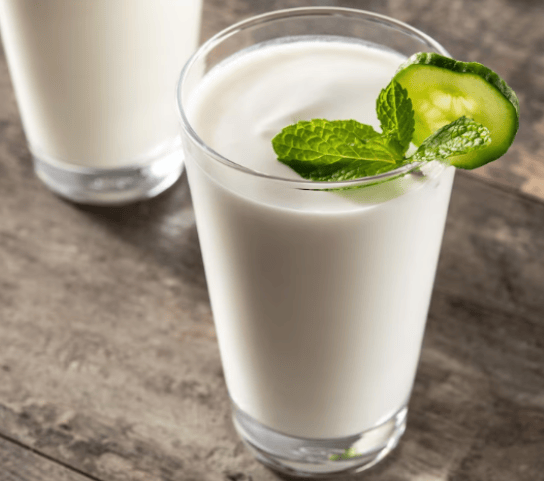Your gut does way more than just digest food. It plays a central role in your immune system, helps regulate mood and mental clarity, and even affects your skin and sleep. That’s why gut health is such a hot topic—and why what you eat and drink really matters.
While most people focus on food, your beverage choices can make a big difference too. Some drinks are packed with probiotics, prebiotics, or anti-inflammatory compounds that help soothe and strengthen the gut lining. Others? Not so helpful (we’re looking at you, sugary sodas).
In this article, we’re highlighting five of the best drinks for gut health—each one simple, natural, and backed by science. Whether you’re dealing with bloating, digestive issues, or just want to feel better day-to-day, these gut healing beverages can offer real support from the inside out.
Ready to sip smarter? Let’s explore what your gut really wants you to pour in your glass.
Why Gut Health Matters
Your gut is more than just a digestion machine—it’s a central hub for your entire body’s well-being. A balanced gut microbiome (the trillions of bacteria living in your digestive tract) plays a key role in breaking down food, absorbing nutrients, regulating inflammation, and even supporting your immune system.
When your gut is out of balance, it can show up in surprising ways: bloating, constipation, irregularity, brain fog, fatigue, and even low mood or skin issues. That’s why nurturing your gut isn’t just about comfort—it’s about total body health.
Thankfully, small daily choices make a big impact. Your diet and hydration habits are some of the easiest places to start. Choosing drinks that improve gut health—those rich in probiotics, prebiotics, or anti-inflammatory compounds—can help bring balance back to your microbiome naturally.
The right gut healthy drinks support digestion, feed your good bacteria, and help your system run more smoothly from the inside out. Let’s take a closer look at what your gut loves to drink.
5 Best Drinks for Gut Health
Your gut isn’t just where digestion happens—it’s a central part of your immune system, hormone regulation, and even mental health. And while food plays a huge role in maintaining a balanced gut microbiome, what you drink matters, too. Certain beverages contain powerful nutrients, probiotics, and compounds that can soothe inflammation, support digestion, and rebuild a healthy gut lining.
Here are five of the best drinks for digestion that are backed by science and easy to add to your daily routine.
1. Kombucha
Kombucha is a fizzy, slightly tangy fermented tea known for its rich probiotic content. It’s made by fermenting sweetened tea with a SCOBY (symbiotic culture of bacteria and yeast), resulting in a drink full of beneficial bacteria.
Gut Benefits:
- High in probiotics that support microbial balance in the gut
- May improve digestion and reduce bloating
- Contains polyphenols from tea that offer antioxidant support
A review in Frontiers in Nutrition highlighted how probiotic-rich beverages like kombucha can help restore gut flora diversity and protect against inflammatory bowel issues.
Usage Tips:
Start with small amounts (4–6 oz per day) to avoid digestive upset. Choose brands with low added sugar, or make your own at home for maximum benefit.
2. Kefir

Kefir is a fermented milk drink, often made from cow, goat, or non-dairy alternatives like coconut or almond milk. It contains a diverse range of probiotic strains—often more than yogurt—and digestive enzymes.
Gut Benefits:
- May help rebalance gut flora and suppress harmful bacteria
- Supports lactose digestion even in lactose-intolerant individuals
- Rich in B vitamins and calcium for gut and bone health
A 2021 study in Foods journal found that regular kefir consumption improved gut barrier integrity and microbial diversity better than traditional yogurt.
Usage Tips:
Drink 1 cup daily on its own or blend into smoothies. If you’re new to probiotics, start with smaller amounts to allow your gut to adjust.
3. Ginger Tea
While not fermented, ginger tea is a time-tested herbal remedy with powerful digestive benefits. Its active compounds—like gingerol and shogaol—have strong anti-inflammatory and antioxidant properties.
Gut Benefits:
- Reduces bloating, gas, and nausea
- Promotes gastrointestinal motility (how fast food moves through your digestive system)
- Can help relieve indigestion and stomach cramps
A 2019 clinical trial published in Phytotherapy Research found that ginger supplementation significantly improved digestion speed and reduced gut discomfort.
Usage Tips:
Steep fresh ginger slices in hot water for 10–15 minutes. Drink before or after meals to ease digestion. Add lemon or honey for extra flavor and benefits.
4. Bone Broth
Bone broth is made by simmering animal bones and connective tissue for hours, releasing nutrients like collagen, gelatin, and amino acids such as glutamine—all of which are known to support gut lining repair.
Gut Benefits:
- Helps repair leaky gut and intestinal permeability
- Rich in glycine and proline, which support tissue regeneration
- Provides minerals like magnesium, calcium, and phosphorus
Research in Nutrients (2022) suggests that collagen peptides may improve gut barrier function and reduce inflammation in the digestive tract.
Usage Tips:
Sip warm bone broth daily or use it as a base for soups and stews. Choose grass-fed or organic sources when possible. For convenience, shelf-stable or powdered versions are also available.
5. Aloe Vera Juice (in Moderation)
Aloe vera juice, derived from the inner gel of the aloe leaf, has soothing, anti-inflammatory properties that can benefit the digestive system—especially when used in moderation.
Gut Benefits:
- May soothe inflammation in the gut lining
- Supports regular bowel movements without harsh laxatives
- Contains polysaccharides that may help feed beneficial gut bacteria
A study published in the Journal of Research in Medical Sciences (2018) reported that aloe vera improved symptoms of irritable bowel syndrome, including bloating and abdominal pain.
Usage Tips:
Start with 1–2 tablespoons mixed in water. Look for purified, decolorized aloe vera juice to avoid potential toxins like aloin, which can cause digestive upset if consumed in excess.e. Avoid versions with added sugars or laxatives, and consult your doctor if you have digestive conditions.
When adding any of these probiotic drinks or gut-healing tonics to your diet, consistency matters more than quantity. Start with one or two, rotate them, and pay attention to how your body responds. Not every gut reacts the same way, and it’s all about finding what works best for you.
How to Incorporate These Drinks Daily
Adding natural digestive drinks to your routine doesn’t have to be complicated or expensive. With a little planning, you can work them into your day in simple, sustainable ways.
Start your morning with a warm mug of ginger tea or lemon water. Both are gentle on your stomach and help kick-start digestion for the day. If you’re feeling adventurous, add a dash of apple cider vinegar for an extra probiotic punch.
Instead of reaching for soda or sugary drinks during the day, swap in kombucha. It’s fizzy, flavorful, and packed with gut-friendly bacteria—just make sure you choose a low-sugar brand.
Feeling that mid-afternoon energy dip? Heat up a cup of bone broth. It’s comforting, filling, and easy on your gut. It also doubles as a light dinner option if you’re not super hungry.
In the mornings or after workouts, blend kefir into a smoothie with berries and spinach for a probiotic boost. It’s creamy, tangy, and great for your microbiome.
And don’t forget aloe vera juice—just 1–2 ounces, diluted with water, two to three times a week can help soothe your gut and support bowel regularity.
The key to supporting a healthy microbiome is consistency. Try a few options, mix them into your routine, and sip your way to better digestion.
Drinks to Avoid for Gut Health
While some beverages support your digestive system, others can do real harm—especially when consumed regularly. Knowing which drinks are bad for digestion is just as important as adding in gut-friendly options.
Sugary sodas and energy drinks top the list. They’re high in added sugars, which can feed harmful bacteria in the gut and throw off your microbiome’s balance. The carbonation and artificial additives don’t help either.
Alcohol, particularly in large amounts, can damage the gut lining, reduce beneficial bacteria, and increase inflammation. Even moderate drinking may disrupt your digestive health over time.
Don’t forget about artificially sweetened drinks. Some sugar substitutes like sucralose and aspartame have been linked to changes in gut bacteria, bloating, and discomfort.
Lastly, be cautious with heavily processed fruit juices. Even those labeled “natural” can be loaded with sugar and stripped of fiber—turning a healthy-sounding drink into something your gut won’t love.
One of the simplest gut health tips? Choose beverages with minimal processing and ingredients you recognize. Your gut—and your energy—will thank you.
FAQs: Gut-Friendly Drinks
Can I drink kombucha every day?
Yes, many people enjoy kombucha daily with no issues. It’s a fermented tea rich in probiotics, which can support gut health when consumed in moderation. Stick to 4–8 oz per day, especially if you’re new to it, and choose low-sugar versions to avoid overloading your system with added sugars.
What’s the difference between kefir and yogurt drinks?
Both kefir and yogurt are fermented dairy products, but kefir generally contains more probiotic strains and is thinner in texture—more like a drink than a spoonable snack. Yogurt typically has 2–3 live cultures, while kefir may have 10 or more. It also tends to be easier to digest for those who are lactose-sensitive.
Is coffee bad for your gut?
Coffee isn’t necessarily harmful—in fact, it can help promote motility (aka, keeping things moving). However, for some people, especially those with sensitive stomachs or reflux, it can irritate the gut lining. If you’re unsure, pay attention to how your body reacts and avoid excessive amounts or drinking it on an empty stomach.
Are these drinks safe for kids or pregnant women?
In general, natural gut-friendly drinks like ginger tea, kefir, and bone broth are safe in moderation. However, kombucha and aloe vera juice may not be recommended for young children or during pregnancy due to their fermentation, alcohol traces, or laxative effects. Always consult a healthcare provider for personalized advice.
Conclusion: Sip Your Way to a Healthier Gut
Improving your digestion doesn’t require a total diet overhaul—just one gut-friendly drink a day can kickstart real change. Whether it’s kefir in your smoothie, kombucha instead of soda, or a warm mug of ginger tea, these simple choices help build a stronger, more balanced microbiome.
By focusing on hydration, fermented drinks, and anti-inflammatory ingredients, you’re supporting not just your gut, but your immune system, energy, and mental clarity too.
Start small. Try rotating a few of these drinks for gut health into your week and pay attention to how your body responds. Over time, those tiny shifts can lead to a big transformation.
A gut healthy lifestyle doesn’t have to be complicated—it can start with a single sip. So raise your glass (or mug or bottle) to better digestion and better days ahead.
